The short, intriguing career of Public History Ryan Gosling
03 October 2012 – editors
digital media, projects, public engagement, publicity, scholarship, training, social media, graduate students
~ Annie Cullen and Rachel Boyle, graduate students in Public History at Loyola University Chicago, are the creators of Public History Ryan Gosling, a blog that pairs the popular “Hey Girl” meme with public history theory. The project has reached over 60,000 people and stimulated meaningful conversation in various corners of the Internet. In this post, Annie and Rachel discuss how the overwhelming success of Public History Ryan Gosling reveals the strengths and weaknesses of popular culture as a tool for public historians.
Annie: In the postmodern age, our lives are constantly populated by popular culture—music, media, television, you name it. I think Public History Ryan Gosling (PHRG) was so popular in part because we as public historians merged academic dialogue with popular culture. Ultimately, it allowed us to reach a wider audience.
Rachel: I agree that popular culture pervades daily life and serves as a powerful opportunity for public historians to access broader audiences. Yet I find myself questioning the degree to which the plebian nature of popular culture undermines the professional credibility of a public historian. After all, the popularity of PHRG depends on a tone of ironic seduction, pairing visual pleasure with dry intellectual references. The unexpected juxtaposition creates humor because theory and pleasure generally do not mix. This apparent incompatibility suggests that there is an unnecessary barrier between the professional and the popular. The barrier certainly feels real; I cannot seem to avoid a nagging embarrassment that my biggest graduate school success thus far revolves around pseudo-fantasies of a pretty celebrity. Does PHRG debase theory or elevate popular culture? Does it matter? Should it matter?
Annie: If theory “elevates” popular culture as you suggest, it can also risk alienating its audience. For example, many PHRG images made reference to obscure literary and historiographical texts from the likes of Roland Barthes, Michel-Rolph Trouillot, and Clifford Geertz. The potential to alienate the lay reader certainly exists. The Presence of the Past by Roy Rosenzweig and David Thelen made clear that the public enjoys history most when it relates to their own families, experiences, and/or heritage. Do these academic memes run the risk of widening the gap between the ivory tower and the history consumer?
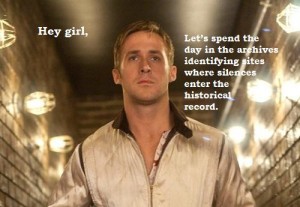
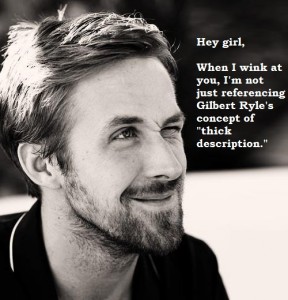 Rachel: Yes—online intellectual communities definitely risk reifying the privileged world of academia. But even within academia, online communities can potentially encourage interdisciplinary dialogue. One of our PHRG images referenced experimental film and consequently attracted the attention of a substantial community of film students. We also had a strong, thoughtful response from anthropologists and literary students to a post about ethical issues surrounding oral history. Perhaps PHRG’s forays beyond the traditional realm of historical content provide a framework for luring non-academic audiences by interspersing heavy theory with more lighthearted references.
Rachel: Yes—online intellectual communities definitely risk reifying the privileged world of academia. But even within academia, online communities can potentially encourage interdisciplinary dialogue. One of our PHRG images referenced experimental film and consequently attracted the attention of a substantial community of film students. We also had a strong, thoughtful response from anthropologists and literary students to a post about ethical issues surrounding oral history. Perhaps PHRG’s forays beyond the traditional realm of historical content provide a framework for luring non-academic audiences by interspersing heavy theory with more lighthearted references.
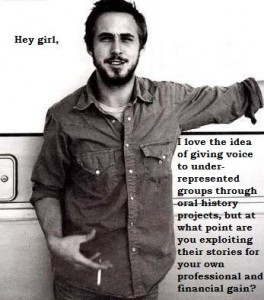
Annie: This is most definitely true. The biggest surge in unique visitors—upwards of 20,000 people in a matter of days—found PHRG because that experimental film image was reblogged on a film criticism website. Our most popular post, which was reblogged and liked over 700 times, referenced song lyrics from musical artist The Blow. The possibilities for a broad audience multiply exponentially when playful pop culture references are intermixed with the theoretical. Similarly, memes themselves can also be of critical use to the public historian. A meme-gone-viral creates a sense of community in which its readers are all “in on the joke.” Not only do they share in the implicit puns conveyed by each image, but the ability to reblog, tweet, or share them on Facebook makes the reader an active participant in the dissemination of the memed images. This shared authority gets to the very essence of public history practice.
Rachel: Effective utilization of memes requires an intimate knowledge of the online world. Digital citizens spend an abundance of time loitering on the Internet and becoming immersed into the world of vernacular culture. (Public) historians need to abandon the Luddite and erudite inclinations of the scholar and get lost in the rabbit holes of the interwebs.
Annie: You raise an interesting point; however, do we run the risk of alienating those not interested in popular culture? Not everyone watches Ryan Gosling films or follows online memes. Are there ways to bridge the gap or must public historians be simultaneously engaging a multitude of avenues for the dissemination of history and theory? That sounds like a lot of tired, overly-stretched public historians to me.
Rachel: That is certainly a risk, especially considering the ephemeral nature of online culture. Public History Ryan Gosling lost his cachet within months; by now he is somewhat outdated and irrelevant. (Was Ryan Gosling even in any movies this summer?) The transient nature of the Internet and popular culture more broadly severely limits the long term impact of blogs like PHRG. Yet while PHRG may no longer evolve in any meaningful way, the success of the project nevertheless emphasizes the power of the historian immersing herself into online and popular culture in order to take advantage of constantly emerging—if short-lived—opportunities to engage the public. It is definitely worth the effort for public historians to engage the online world in order to emerge as a critical and dynamic presence in the world of popular culture.




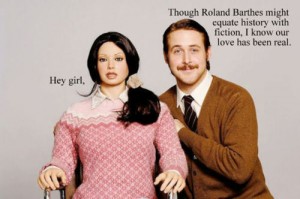
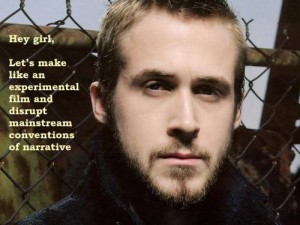
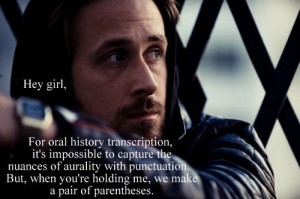
Thanks for the further evidence that history, by itself, doesn’t sell. We’ve been saying it for a while now.
http://peabodyslament.wordpress.com/2011/07/29/next-on-the-history-channel/
Cheers,
T.H. Gray, Director-Curator
American Hysterical Society
When you created PHRG were you inspired by any of the other discipline-specific RG sites out there, like advertising Ryan Gosling http://advertisingagencyryangosling.tumblr.com/ or those listed here: http://www.insidehighered.com/news/2011/12/13/ryan-gosling-pick-line-meme-reaches-academe? I’m curious about the history of the meme itself…
Hey Adina,
Thanks so much for the question. Both the Ad Agency and Library Ryan Gosling varieties began after we started PHRG in early November 2011. That’s not to say we weren’t interested in Ryan Gosling memes, however. When we got started, we were inspired by the Feminist Ryan Gosling tumblr written by University of Wisconsin Women’s Studies grad student Danielle Henderson which began in October 2011. Before we started PHRG, this was the only Ryan Gosling meme I knew (though I cannot speak for my partner in crime Rachel Boyle).
Love this post and its interest in prodding public historians to be a bit more creative and playful. Part of the goal, it seems, is raising visibility for us. Public history has its institutions and degrees, but it’s not something that the average person knows about. I think we’d be hard pressed to look for better models than our colleagues in the library world, who have very successfully used the modalities of internet interactivity to strengthen their community and raise visibility.
So smart and fantastic! Congrats on a great blog, and particularly the connections to other fields!
~Anne
I really enjoyed the presentation you two (and the other panelists as well!) gave at the NCPH in Ottawa in April. It has been in my head for weeks and will help inform and inspire many projects I will engage in with high school teachers next year in Quebec. Just to let you know, I link back to this conversation from my (rather casual) blog post entitled “3 a.m. blogging, and why social sciences (/school) should be social, and public!” at
http://blogs.learnquebec.ca/wordpress-mu/blog/2013/05/3-am-blogging-and-why-social-sciences-school-should-be-social-and-public/
Also, I would love to get a copy of that Prezi you showed. Any chance of that being linked to from here?
Hi Paul,
Thanks so much for attending our panel and continuing the conversation. Here is a link to our prezi from the conference:
http://tinyurl.com/bmco6b9